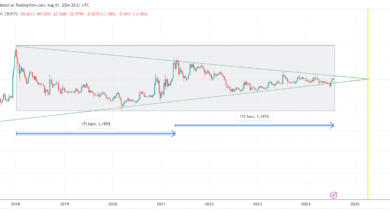Digital Euro: The Future of Central Bank Digital Currencies

The digital Euro is set to revolutionize the European financial landscape, positioning itself as a key player in the realm of central bank digital currencies (CBDC). As nations increasingly turn towards digital alternatives, the European Central Bank is actively exploring the potential benefits and implications of such a currency. With discussions surrounding digital currency privacy emerging as a pivotal concern, many stakeholders are keenly interested in how this initiative could enhance user experience and security. In light of the upcoming decision expected in October, debates within political circles are intensifying over the viability and functionality of the digital Euro. As participants come together to analyze the paradigm shifts in currency usage, the future of this digital asset remains a hot topic, demanding clarity and collaboration from all involved.
Central bank-issued digital payment solutions are rapidly gaining traction globally, with the concept of the digital Euro leading discussions in Europe. The advent of this virtual currency is anticipated to address various challenges tied to traditional payment systems while offering enhanced benefits like improved transaction efficiency. Key stakeholders, including policymakers and finance experts, are delving into discussions regarding the features of this digital currency, particularly its privacy measures and user engagement. As nations like China pave the way with their central bank digital currencies, Europe finds itself at a crossroads, needing innovations that meet consumer expectations of security and simplicity. This evolving landscape of digital finance is a reflection of broader shifts in how society perceives and interacts with money.
The Rise of Central Bank Digital Currencies (CBDCs)
Central Bank Digital Currencies (CBDCs) have become a focal point in the global financial landscape, with 114 countries delving into their development. This surge in interest underscores the importance of evolving payment systems and the need for governments to innovate amidst technological advancements. The European Central Bank (ECB) is part of this collective, exploring the potential benefits and structures of a digital Euro as it researches ways to implement a stable and secure digital currency.
The growing interest in CBDCs reflects a significant shift in how monetary policy could be executed in the future. Unlike traditional currencies, CBDCs offer central banks the ability to manage the digital economy more effectively. This may include enhanced transaction transparency, reduced costs for cross-border payments, and the opportunity to provide direct financial services to consumers, potentially increasing financial inclusion. As nations explore the intricacies of these digital currencies, the implications for consumer choices and banking systems are becoming increasingly clear.
Implications of the Digital Euro for Consumers
The digital Euro poses both advantages and challenges for end consumers who are already accustomed to digital payments through platforms like Apple Pay or Google Pay. Privacy is a significant concern in this discussion, as many users prioritize their personal data security. Florian Toncar, the parliamentary secretary of the Federal Ministry of Finance, emphasized that the potential for better privacy could motivate consumers to prefer the digital Euro over existing private solutions. This highlights the need for a robust framework that addresses privacy concerns while maintaining an efficient payment system.
Additionally, the usability of the digital Euro in various contexts, whether online or offline, is a critical aspect that needs further exploration. Jonas Gross from the Digital Euro Association noted that the ability to transact seamlessly in both environments could provide users with a unique experience. However, real consumer benefits remain somewhat ambiguous at this stage, and stakeholders must engage in dialogue to clarify these issues. By doing so, they can emphasize the digital Euro’s value proposition and ensure its adoption among consumers.
The Role of Political Discourse in CBDC Development
Political engagement is paramount in shaping the future of the digital Euro and other CBDCs. Recent discussions in Germany’s Bundestag, led by Frank Schäffler of the Free Democrats, showcase the varied opinions and interests of stakeholders from the financial sector. Policymakers need to address not only the technical aspects of CBDC implementation but also the public sentiment surrounding privacy and regulation. As such discussions continue, the interplay between financial innovation and political agendas will significantly impact how these digital currencies are perceived and adopted.
The dialogue surrounding the digital Euro stresses that this initiative is as much about public trust as it is about technological advancement. Each stakeholder brings a unique perspective that influences the likelihood of a successful rollout. As the ECB maneuvers through these discussions, it must balance the desires of governments, consumers, and the financial industry to achieve a practical and widely accepted digital currency framework. This governance will ultimately dictate the pace and direction of the digital Euro initiative.
Consumer Privacy and Digital Currency
Privacy in digital transactions has emerged as a key topic in discussions surrounding the digital Euro. In an age where data breaches and privacy invasions are frequent, ensuring consumer protection is paramount. Analysts note that without significant privacy features, the digital Euro may struggle to alter consumer behavior and gain traction compared to established private payment methods. For consumers to feel secure in utilizing a government-backed currency, the ECB must clearly address how it will safeguard their data while allowing for efficient transactions.
As the ECB continues its research and development phase, the clarification of privacy protocols will play a crucial role in building trust. With options for more discreet transactions available in the market, the ECB must innovate while adhering to fundamental privacy principles. A proactive approach toward consumer privacy can not only differentiate the digital Euro but also foster greater acceptance and use among a privacy-conscious demographic.
European Central Bank’s Strategic Decisions on CBDC
As the European Central Bank (ECB) weighs the future of the digital Euro, its strategic decisions will significantly affect not just monetary policy, but also the broader economic landscape. With a focus on the advantages that a digital currency can offer, such as improved transaction efficiencies and the ability to respond to the rise of cryptocurrencies, the ECB finds itself at a critical juncture. The upcoming decision in October regarding the digital Euro’s future could set a precedent for other nations contemplating similar pathways.
The ECB must navigate rigorous discussions with finance ministers across EU countries, taking into account their co-determination rights in influencing the digital Euro’s framework. This collaboration emphasizes the importance of cohesive regional policies that align with the digital currency’s objectives. Ultimately, the ECB’s choices could redefine not only the payment systems in Europe but also influence global standards for CBDCs.
Advantages of a Digital Euro in the European Financial Ecosystem
The potential advantages of a digital Euro extend beyond mere convenience; they signify a transformation in how consumers and businesses interact within the European financial ecosystem. With features such as direct access by consumers to central bank accounts, a digital Euro could democratize financial services and increase market competitiveness. This shift aims to ensure that both large corporations and small businesses benefit from lower transaction costs and enhanced payment security.
Furthermore, the introduction of a digital Euro could streamline the cross-border payment process within the Eurozone. By modernizing these systems and reducing the reliance on third-party financial services, the ECB could facilitate smoother transactions and encourage economic growth. As stakeholders analyze these benefits, the need for comprehensive regulatory frameworks becomes essential to harnessing the full potential of a digital Euro while maintaining a balance between innovation and safety.
Challenges Facing the Digital Euro Launch
While the prospects of a digital Euro are promising, the path to its successful implementation is fraught with challenges. Key among these challenges is addressing public concerns regarding privacy and data security. The ECB must develop a system that not only protects consumer information but also conforms to stringent regulations both within Europe and internationally. Failure to address these concerns could deter user adoption and undermine the currency’s credibility.
Additionally, the ongoing global competition with alternative digital currencies, such as Bitcoin and stablecoins, presents a significant hurdle. As highlighted by experts like Philipp Sandner, the ECB faces mounting pressure to innovate quickly. Moreover, addressing the unique needs of diverse consumer segments will be critical in developing a digital Euro that resonates with all users. Thus, a strategic approach is necessary to build confidence and ensure the digital Euro meets the expectations of both commercial entities and everyday consumers.
Public Perception and Acceptance of Digital Currency
Public perception plays a pivotal role in the acceptance and success of the digital Euro. As conversations around CBDCs grow, understanding how consumers view digital currencies will inform central banks’ strategies and designs. Stakeholders must consider the potential fears and misconceptions surrounding digital currencies, particularly regarding their impact on traditional banking and consumer sovereignty.
Moreover, engaging the public through educational initiatives can help demystify the digital Euro and foster trust. Addressing concerns about the implications for financial privacy, regulatory compliance, and the future of payment systems will be integral to this process. By actively involving consumers in the conversation, the ECB can build confidence in the digital Euro, ensuring a supportive environment for its launch.
The Future of CBDC and Financial Innovation in Europe
As the landscape of financial innovation continues to evolve, the future of Central Bank Digital Currencies (CBDC) like the digital Euro represents a significant shift in how value is stored and transacted. The emergence of CBDCs will compel traditional financial systems to adapt and potentially reshape the global finance architecture. Observers believe that the digital Euro could play a pivotal role in establishing new norms for currency usage, driving forward the agenda for modern financial systems across Europe and beyond.
The interplay between CBDCs and financial innovation suggests a transformative era in monetary policy, where central banks leverage technology to enhance their capabilities and respond to the digital economy’s demands. The ECB’s journey with the digital Euro will undoubtedly influence other central banks, prompting a wider discourse on how these institutions can contribute to a safer and more efficient financial ecosystem. Ultimately, this evolution may lead to new standards in privacy, efficiency, and accessibility for financial services in the future.
Frequently Asked Questions
What is the digital Euro and its significance in the landscape of central bank digital currencies (CBDCs)?
The digital Euro is a proposed form of central bank digital currency (CBDC) being researched by the European Central Bank (ECB). Its significance lies in providing a secure and efficient payment solution that complements cash while ensuring privacy and enhancing financial inclusion in Europe.
How is the European Central Bank approaching the development of the digital Euro?
The European Central Bank is currently in the research phase for the digital Euro. A decision regarding its future will be made in October, as the ECB evaluates the benefits, risks, and potential features of this central bank digital currency.
What are the potential benefits of adopting a digital Euro for consumers?
The adoption of a digital Euro could offer several benefits for consumers, including increased transaction efficiency, lower costs for cross-border payments, and enhanced privacy compared to private payment solutions like Apple or Google Pay.
How will digital currency privacy be maintained with the implementation of the digital Euro?
Digital currency privacy will be a key consideration for the digital Euro. Officials, including Florian Toncar from the Federal Ministry of Finance, emphasize that preserving user privacy will be essential to encourage consumers to adopt the digital Euro over existing private solutions.
What challenges does the European Central Bank face in launching the digital Euro?
The ECB faces several challenges in launching the digital Euro, including ensuring sufficient consumer privacy, addressing competition from cryptocurrencies like Bitcoin and stablecoins, and navigating political discussions among EU finance ministers.
How does the digital Euro aim to function both online and offline?
One of the envisioned features of the digital Euro is the ability to be used both online and offline, providing flexibility to consumers in various transaction environments. This dual functionality is viewed as a crucial advantage for the acceptance of central bank digital currencies.
What role do political discussions play in the future of the digital Euro?
Political discussions, such as those held by the FDP in Germany, play a significant role in shaping the future of the digital Euro. Stakeholders from various sectors express their concerns and expectations, influencing the ECB’s approach to developing this central bank digital currency.
Why does the ECB feel pressured in relation to the development of the digital Euro?
The ECB feels pressured to develop the digital Euro due to competition from Bitcoin, stablecoins, and other countries, notably China, which has already introduced its CBDC. This pressure highlights the need for innovation in the European payment system.
| Key Points | Description |
|---|---|
| Global Interest | 114 countries, including the European Central Bank, are exploring Central Bank Digital Currencies (CBDC) as of early 2023. |
| Digital Euro Decision | A significant decision regarding the digital Euro is expected in October. |
| Privacy Concerns | High levels of privacy are crucial to encourage consumer adoption of the digital Euro over private payment solutions. |
| Stakeholder Engagement | A Bundestag discussion led by Frank Schäffler highlighted various stakeholders’ concerns about the digital Euro. |
| Pressure from Alternatives | The ECB faces competition from Bitcoin, stablecoins, and especially China, which has already implemented its CBDC. |
| Functionality | The digital Euro could potentially support both online and offline transactions, as suggested by industry experts. |
Summary
The digital Euro represents a significant step towards modernizing the European financial landscape. With various countries exploring central bank digital currencies, the importance of the digital Euro is clear. Privacy concerns will play a crucial role in its acceptance among consumers, especially in contrast to established private payment solutions. As stakeholders engage in discussions, the future of the digital Euro is poised to increase in relevance and urgency, particularly with decision-making on the horizon.



